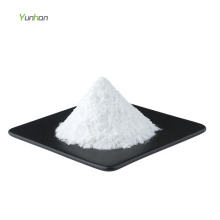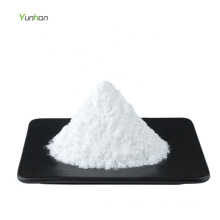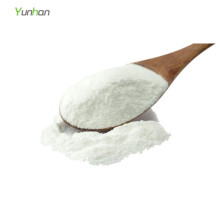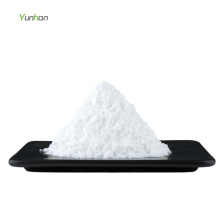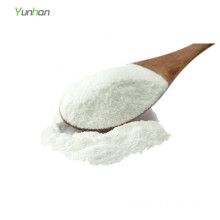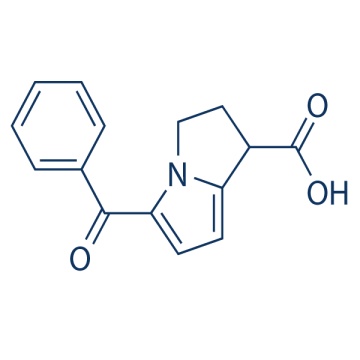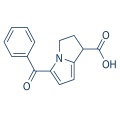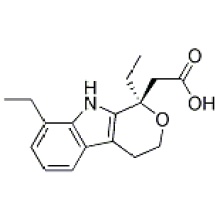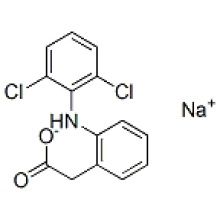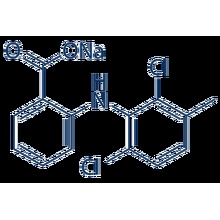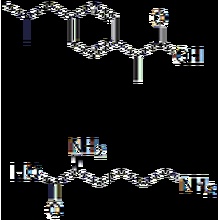Ketorolac 74103-07-4
Product Description
.cp_wz table {border-top: 1px solid #ccc;border-left:1px solid #ccc; } .cp_wz table td{border-right: 1px solid #ccc; border-bottom: 1px solid #ccc; padding: 5px 0px 0px 5px;} .cp_wz table th {border-right: 1px solid #ccc;border-bottom: 1px solid #ccc; padding: 5px 0px 0px 5px;}
Molecular Weight:
255.27 Ketorolac (Ketorolac tromethamine) is a non-selective COX Inhibitor of COX-1 and COX-2 with IC50 of 1.23 μM and 3.50 μM, respectively.
Biological Activity
(R, S)-, (S)-, and (R)-Ketorolac inhibit both isoforms of COX in
recombinant rat and human enzyme systems, and similar as Inhibitors of
rat COX (rCOX) and human COX (hCOX) under the conditions used. (R,
S)-Ketorolac inhibits rat COX-1, rat COX-2, human COX-1 and human COX-2
with IC50 of 0.27 μM, 2.06 μM, 1.23 μM and 3.50 μM, respectively.
The
(S) enantiomer of Ketorolac with IC50 of 0.10 μM for rat COX-1 is
approximately twice as potent as the racemate, whereas the
(R)-enantiomer with IC50 of > 100 μM is virtually without activity. Ketorolac shows inhibition of eicosanoid formation in HEL cells (COX-1)
and LPS-stimulated Mono Mac 6 cells (COX-2) with IC50 of 0.025 μM and
0.039 μM, respectively, but does not significantly inhibit NO
accumulation in supernatants of LPS-stimulated RAW 264.7 cells up to 300
μM.
Ketorolac significantly inhibits thymidine
incorporation of human osteoblasts (hOBs) upon 24 hours treatment in a
dose-dependent manner, and inhibits proliferation and arrests Cell Cycle
at G0/G1 phase in hOBs.
(R, S)-Ketorolac is significantly more potent than indomethacin or
diclofenac sodium in tests of acetic acid-induced writhing,
carrageenan-induced paw hyperalgesia, and carrageenan-induced edema
formation in rats, with ID50 of 0.24, 0.29 and 0.08 mg/kg, respectively.
Ketorolac produces significant inhibition of COX-1
activity and gastric PG synthesis with doses of ≥1 mg/kg inhibiting
COX-1 activity by 95% and gastric PG synthesis by >88%. Ketorolac
does not significantly affect COX-2 activity at doses of ≤3 mg/kg, but
at doses of 10 and 30 mg/kg, Ketorolac produces significant inhibition
of COX-2 activity by 75% and 91%, respectively. Ketorolac causes gastric
damage in rats only at doses that inhibits both COX-1 and COX-2, or
when given with a COX-2 inhibitor.
Contact us if you need more details on 74103-07-4. We are ready to answer your questions on packaging, logistics, certification or any other aspects about Ketorolac 74103-07-4、74103-07-4 Ketorolac. If these products fail to match your need, please contact us and we would like to provide relevant information.
Molecular Weight:
255.27 Ketorolac (Ketorolac tromethamine) is a non-selective COX Inhibitor of COX-1 and COX-2 with IC50 of 1.23 μM and 3.50 μM, respectively.
Biological Activity
(R, S)-, (S)-, and (R)-Ketorolac inhibit both isoforms of COX in
recombinant rat and human enzyme systems, and similar as Inhibitors of
rat COX (rCOX) and human COX (hCOX) under the conditions used. (R,
S)-Ketorolac inhibits rat COX-1, rat COX-2, human COX-1 and human COX-2
with IC50 of 0.27 μM, 2.06 μM, 1.23 μM and 3.50 μM, respectively.
The
(S) enantiomer of Ketorolac with IC50 of 0.10 μM for rat COX-1 is
approximately twice as potent as the racemate, whereas the
(R)-enantiomer with IC50 of > 100 μM is virtually without activity. Ketorolac shows inhibition of eicosanoid formation in HEL cells (COX-1)
and LPS-stimulated Mono Mac 6 cells (COX-2) with IC50 of 0.025 μM and
0.039 μM, respectively, but does not significantly inhibit NO
accumulation in supernatants of LPS-stimulated RAW 264.7 cells up to 300
μM.
Ketorolac significantly inhibits thymidine
incorporation of human osteoblasts (hOBs) upon 24 hours treatment in a
dose-dependent manner, and inhibits proliferation and arrests Cell Cycle
at G0/G1 phase in hOBs.
(R, S)-Ketorolac is significantly more potent than indomethacin or
diclofenac sodium in tests of acetic acid-induced writhing,
carrageenan-induced paw hyperalgesia, and carrageenan-induced edema
formation in rats, with ID50 of 0.24, 0.29 and 0.08 mg/kg, respectively.
Ketorolac produces significant inhibition of COX-1
activity and gastric PG synthesis with doses of ≥1 mg/kg inhibiting
COX-1 activity by 95% and gastric PG synthesis by >88%. Ketorolac
does not significantly affect COX-2 activity at doses of ≤3 mg/kg, but
at doses of 10 and 30 mg/kg, Ketorolac produces significant inhibition
of COX-2 activity by 75% and 91%, respectively. Ketorolac causes gastric
damage in rats only at doses that inhibits both COX-1 and COX-2, or
when given with a COX-2 inhibitor.
Contact us if you need more details on 74103-07-4. We are ready to answer your questions on packaging, logistics, certification or any other aspects about Ketorolac 74103-07-4、74103-07-4 Ketorolac. If these products fail to match your need, please contact us and we would like to provide relevant information.
Product Categories : Neuronal Signaling > COX Inhibitor
Other Products
Hot Products
Astragaloside AChlortetracycline HCl 64-72-2Paclitaxel 33069-62-4Dexamethasone Acetate 1177-87-3Dinaciclib (SCH727965) 779353-01-4CHIR-124 405168-58-3Ro3280 1062243-51-9TAME 901-47-3CCG-1423 285986-88-110058-F4 403811-55-2Dabigatran (BIBR 953) 211914-51-1H 89 2HCl 130964-39-5T0901317 293754-55-9Aprepitant 170729-80-3Turofexorate Isopropyl (XL335) 629664-81-9BMS-378806 357263-13-9

